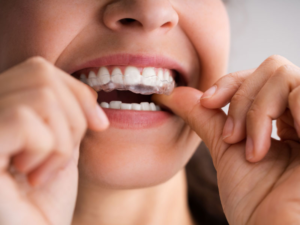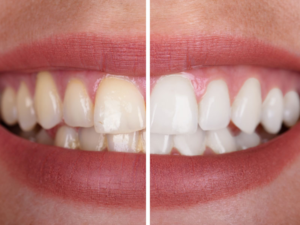
Oral health plays an important role in our overall health. And if you’re pregnant, it’s a vital part of prenatal care. Paying particular attention to your dental health when you’re expecting can help you have a smoother pregnancy – and a healthy baby. However, pregnancy triggers many changes in the body, some of which can have a big impact on your oral health. Just as well then that visiting your dentist is safe – and important – during pregnancy.
Common Oral Health Problems During Pregnancy
Pregnancy may put you at greater risk of gum disease and tooth decay, and your teeth may also start to feel a little loose. This happens because of hormonal changes.
Pregnancy Gingivitis
Around 70 percent of expectant moms get pregnancy-induced gingivitis. Gingivitis is the first stage of gum disease (periodontal disease or periodontitis). It’s caused by a build-up of plaque on and around teeth. Hormonal changes during pregnancy intensify the immune system response to the resulting gum infection, causing inflammation and bleeding.
This can occur any time during pregnancy but is particularly common during the third trimester. Gum disease among expectant mothers has been linked to adverse pregnancy outcomes, including low birth weight and premature birth.
Tooth Decay
Hormonal changes during pregnancy increase acidity levels in the mouth, which increases the risk of cavities resulting from tooth decay. This can be a particular problem if you increase sugar consumption because of pregnancy-related cravings. Problems with oral hygiene during pregnancy may also increase the risk of tooth decay. Pregnant women can develop a very strong gag reflex, which can cause retching when trying to brush their back teeth. The oral bacteria that cause tooth decay can be transmitted to the mouth of the baby in the womb.
Loose Teeth
When you’re pregnant, your body releases a hormone called relaxin. This, as the name suggests, helps relax the pelvis to make giving birth easier. But relaxin also affects other parts of the body, including the structures that support your teeth. So, you may notice your teeth getting a little wobbly during pregnancy. As long as your mouth is healthy, this is nothing to worry about. Tooth movement will stop after birth when your relaxin levels return to normal.
Signs of Oral Health Problems During Pregnancy
Symptoms of oral health problems that may require dental treatment during pregnancy include:
- Bad breath.
- Mouth sores.
- Lumps on the gums.
- New spaces between your teeth.
- Receding gums.
- Pus along the gum line.
- Red or swollen gums.
- Shiny gums.
- Bleeding gums.
- Toothache or other oral pain.
If you have any symptoms like these when you’re pregnant, it’s particularly important to see your dentist. Pain or swelling may indicate an infection. In this case, you need prompt treatment to prevent problems for your baby.
Oral Hygiene During Pregnancy
It’s especially important to keep up a good routine of oral hygiene when you’re expecting.
- Brush your teeth for two minutes twice a day.
- Use a fluoride toothpaste to strengthen dental enamel.
- Spit out toothpaste after brushing. (Don’t rinse your mouth, which will wash away the fluoride).
- Floss daily.
- Maintain a nutritional, balanced diet.
- Limit snacks between meals.
If you’ve vomited because of morning sickness, don’t brush your teeth immediately, which can damage your teeth. Use an alcohol-free fluoride mouthwash instead.
Dental Care During Pregnancy
Dental care is safe when you’re expecting. It’s also crucial to avoid or treat problems such as cavities and gum disease, which can be prevalent among moms-to-be.
Dental care during pregnancy is recommended by:
- The American Dental Association.
- American Congress of Obstetricians and Gynecologists.
- American Academy of Pediatrics.
Let your dentist know as soon as you’re pregnant and tell them about any vitamin or herbal supplements and/or prescription or over-the-counter medications you’re taking.
Preventive Dentistry During Pregnancy
You should make sure you continue to see your dentist during pregnancy for preventive measures such as dental checkups and professional teeth cleanings. Your dentist may recommend extra appointments during your second trimester and early third trimester to help prevent gingivitis and more serious forms of gum disease.
Dental X-Rays During Pregnancy
Your dentist may need to take X-rays of your mouth during a dental exam. The amount of radiation produced during a dental X-ray is very low. It’s safe for both you and your baby, according to the American Pregnancy Association and the American Dental Association. As an extra precaution, a protective, leaded apron will be placed over your abdomen to minimize any exposure to radiation. Your throat will also be covered with a leaded collar to protect the thyroid from radiation.
Dental Procedures During Pregnancy
If you have oral health problems while you’re expecting, dental work such as a filling or a dental crown can lessen the possibility of infection. Dental professionals recommend that any dental procedure should be done during the second trimester. During the third trimester, it may be difficult to lie back in the dental chair for a long time.
Local Anesthesia During Pregnancy
Local anesthesia minimizes discomfort in many dental procedures, such as tooth extraction, fillings and root canal treatment. Studies have shown that a local anesthetic like a lidocaine shot is safe during pregnancy.
Eating Healthily During Pregnancy
It can be easy to overlook the importance of a healthy diet as part of pregnancy dental care. Avoid or limit sugar-laden snacks. Even though you may have pregnancy cravings, these treats will increase the risk of tooth decay and gum disease – issues that can have more serious consequences when you’re expecting.
You also need to focus on a diet that’s balanced and nutritional. This will help the oral health of both you and the baby in your womb, which will start to grow teeth after about three months. Make sure you’re getting plenty of calcium by eating yogurt, cheese and other dairy products. These foods also help your baby develop healthy teeth and gums and bones. It’s also important to ensure an intake of nutrients such as protein, iron, folic acid, and iodine.
Want to Know More About Oral Health During Pregnancy?
Reach out to Irving TX dentist Dental Concepts & Orthodontics to find out more about oral health care during pregnancy.







